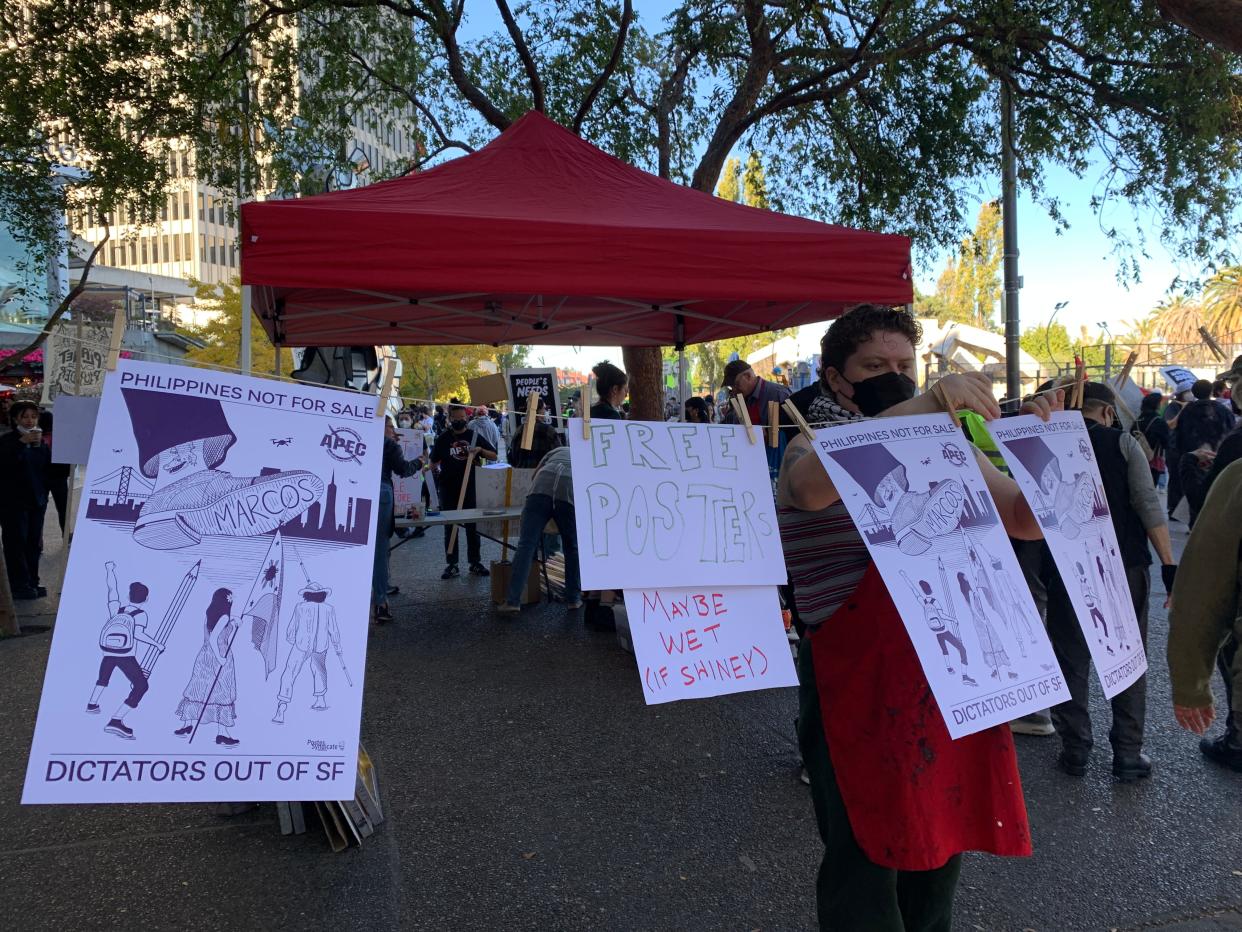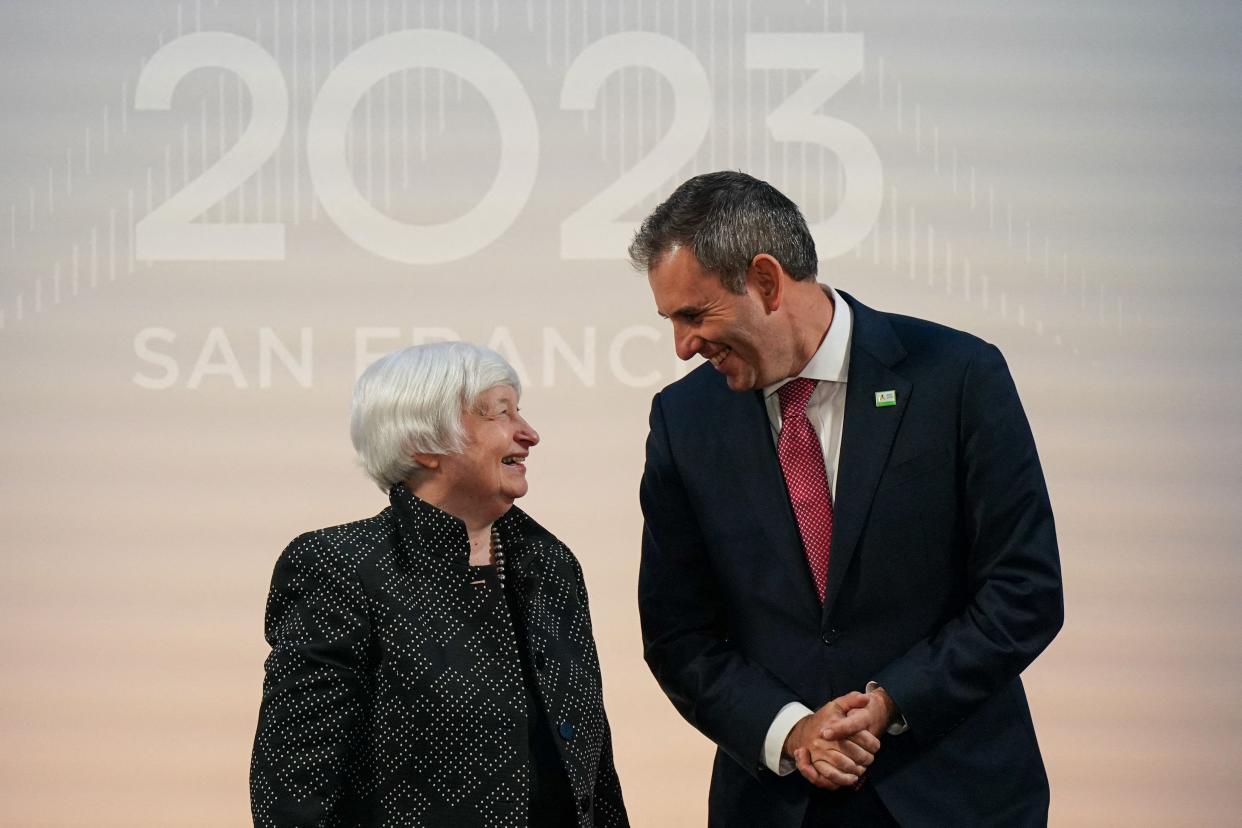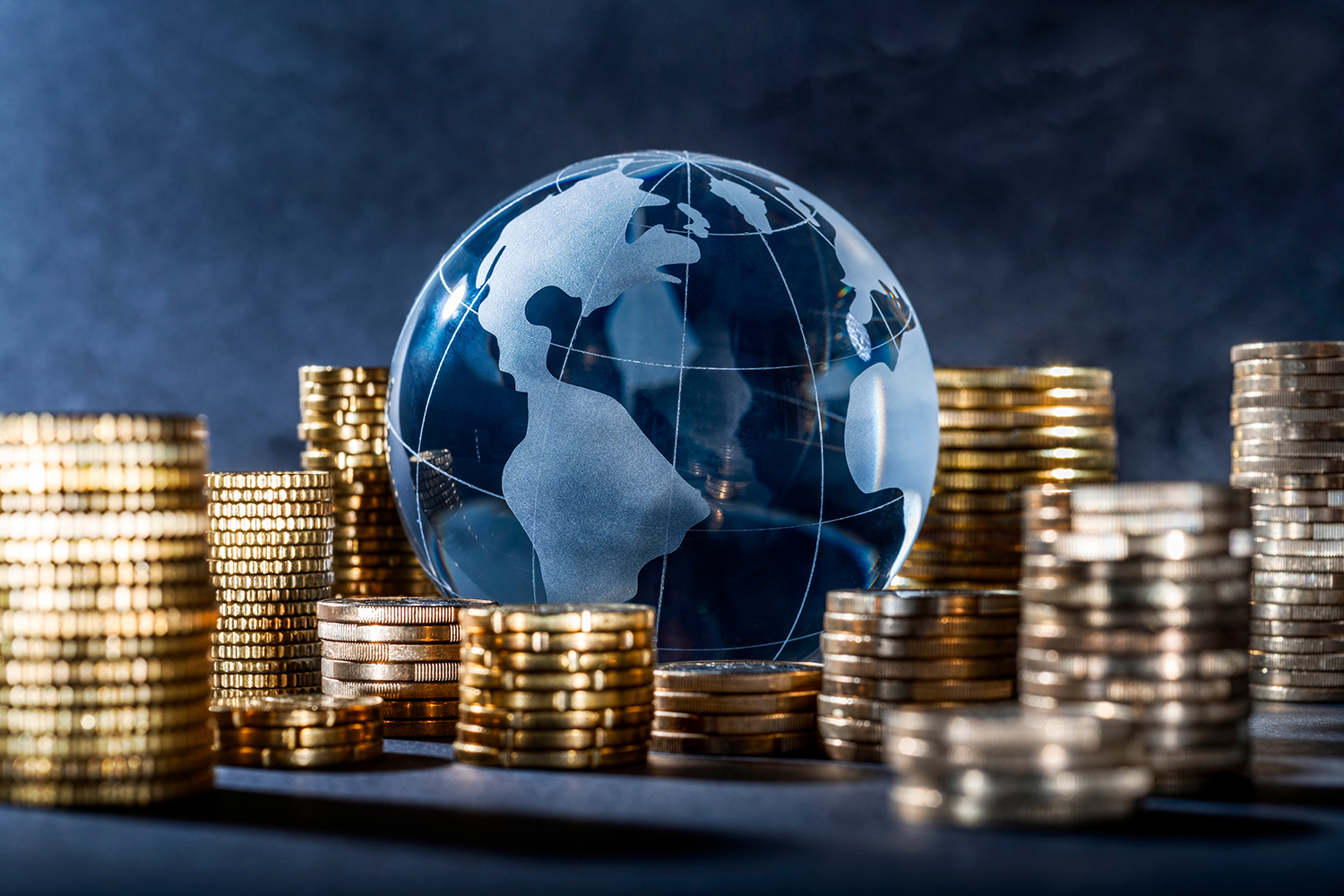 Todays Headlines.
Todays Headlines.
Made In Canada APEC Climate Accord.
More Hot Air in Sydney Declaration.
And, Harper gets his wish.
So if Kyoto is a failure for Australia, Canada, and the United States they get to scuttle the whole deal with their Sydney Declaration on Climate Change
Which Harper can further use as evidence that Kyoto doesn't work. Abroad or at home. Canada will then set its own targets regardless of Kyoto. Which was his agenda all along. That and killing bill C-3o.
Note that the mutually agreed upon target date is the Tories target date of 2050.
Orwellian speak abounds in and around the APEC Anti-Kyoto statement. And that is all it is. An attempt to justify Canada's target date versus that of the rest of the G8 which has set more rapid targets.
"No one meeting, no one agreement is going to fix this issue," Howard said of human-caused climate change. "Kyoto didn't fix it. The Canadian prime minister made the comment about Kyoto that it was really an agreement that produced two groups of countries, those countries that didn't have any targets to meet, and those countries that have failed to meet the targets that were set."
But Harper said Howard was taking his comments out of context, and even messed up the punch line of his joke.
"The quip I think I said in a (previous international) leaders' meeting was that Kyoto divided the world into two groups: those that would have no targets and those that would reach no targets. It's, as I say, just a quip, but I think there's a fair amount of truth to it."
The Sidney Declaration is a self fulfilling prophecy for Harper and Howard.
Prime Minister Stephen Harper says it premature to be demanding climate-change goals of other countries, but he hopes that the participants at this weekend's APEC conference can at least agree those goals must be set. "We haven't reached the point where we can dictate targets to the rest of the world," the Prime Minister told a late afternoon press conference on Friday.
Mr. Harper pointed out that the reduction targets set out in the Kyoto Accord — targets that his government rejects as being too costly to the environment — were never approved by countries that produce two third's of the world's emissions. And he said he believes that a G8 meeting held last June in Berlin produced the most reasonable approach to cutting the production of the gases that have been linked to global warming.
"Canada, Japan and others have articulated a specific goal that we would like to see which is a reduction of emissions by half by the year 2050. Not everybody even in the G8 yet subscribes to that," said Mr. Harper.
The 1997 Kyoto treaty – aimed at halting the speed of global warming – treats developing countries differently. It puts the burden of mandatory emissions cuts squarely on the shoulders of wealthy countries.
Harper, Howard and U.S. President George W. Bush are critical of that deal, with Harper suggesting yesterday it offered developing countries an escape hatch.
"Let's remember . . . if we can get an international protocol, this is a big, big step. It will be the first time the world has done this. In the Kyoto protocol, nations representing two-thirds of emissions essentially opted out. So we have to do a better job next time."
But Graham Saul, of Climate Action Network Canada, said in a telephone interview from Ottawa that Harper's statement is "outrageous" and "a total misrepresentation" of Kyoto's premise of "common but differentiated responsibilities."
"Kyoto is based on the principle that the rich countries are disproportionately responsible for the problem and so bear disproportionately the responsibility for solving it, and poor countries like India, where 500 million people don't even have light bulbs in their homes, shouldn't be forced to accept binding targets."
Until a global deal is reached, Harper also told reporters Canada would do well to join a group like the Asia Pacific Partnership, or AP-6, a six-member group co-founded by the U.S. and Australia that opposes binding targets on governments. Rather, it endorses a voluntary approach to greenhouse gas cuts, leaving governments to establish their own best methods of reaching goals.
Environmentalists have dismissed the climate-change declaration signed Saturday by the leaders of 21 Pacific Rim countries, including Canada.
The deal, announced in Sydney by Australian Prime Minister John Howard, includes the intention to set aspirational — voluntary — emissions reductions targets, and other green initiatives.
"We agree to work to achieve a common understanding on a long-term aspirational global emissions reduction goal," said the Sydney Declaration, issued after the Asia-Pacific Economic Cooperation leaders meeting.
Canada was given credit Saturday for helping the leaders set the targets. "We appreciate the efforts of Japan and Canada in proposing a long-term global goal," the declaration said.
Howard said that it "does transcend a number of international divisions. In particular I note that it is the first such gathering that has included both the United States and China in coming together regarding the aspirational goal."
Even a member of Howard’s cabinet had harsh words about aspirational targets in April. In a lecture at Monash University, Australia’s Foreign Minister Alexander Downer said aspirational targets are “code for ‘a political stunt.’ An aspirational target is not a real target at all.”
This appears to be part of the increasingly popular attempt by resistant governments to SAY they are taking climate change seriously while doing nothing serious about it. Australia's "principles" on climate change were clear enough when it helped to create the anti-Kyoto Asia-Pacific Partnership on Clean Development and Climate: it seemed largely a matter of making the world safe for unrestrained coal exports.
Now, we have the prospect of the more formal and influential APEC organization joining this campaign to set a "long-term aspirationial goal."
It's instructive in these circumstances to listen closely to what people are actually saying. A goal, traditionally, is something that you want to achieve. A "long-term aspirational goal," on the other hand, sounds very like something that you would like to put off, or perhaps merely enshrine in a declaration while continuing to undermine the single international agreement (Kyoto) that has real and measurable climate change "goals."
There has been real movement in the last year on this issue. U.S. President George Bush, Canadian Prime Minister Stephen Harper and Australia's Prime Minister Howard no longer try to deny the science of climate change.
But their new tactic - nodding enthusiastically to a worried electorate while continuing to block international action - is still just so much spin. Until the world's largest energy producers (including coal countries like the U.S. and Australia) stop talking "aspirations" and start committing to measurable targets, there is no reason to take their declarations as anything more than public relations in its most poverty stricken form.
And again we have Alberta/Canada writ into the Sidney declaration, with reference to intensity targets.
Australian Prime Minister John Howard, host of the APEC summit, nevertheless says the leaders have agreed on three "important and very specific things."Firstly, the need for a long-term aspirational global emissions reduction goal. And that is enshrined in the Sydney Declaration," he said. "Secondly, the need for all nations, no matter what their stage of development, to contribute accordingly to their own capacities and their own circumstances to reducing greenhouse gases. Thirdly, we have agreed on specific APEC goals on energy intensity and forestry, and we've also agreed on the important role of clean coal technologies." "Energy intensity" is a measure of energy efficiency. The declaration said members should aim for a 25 percent reduction in energy intensity by the year 2030.
Ironically it is the Chinese who are demanding these three countries meet their Kyoto obligations as the basis for China coming into the second round of the Kyoto accord. Something that won't happen as long as Harper says we can't.
THE Prime Minister, John Howard, compromised on his Sydney climate change declaration to accommodate the tough stance of the Chinese President, Hu Jintao, supporting the United Nations and the Kyoto Protocol. The protocol includes binding targets for developed countries to cut emissions.
At the Asia-Pacific Economic Co-operation forum leaders' meeting on Saturday, shortly before the release of the declaration, Mr Hu bluntly told Mr Howard that the UN Framework Convention on Climate Change "and its Kyoto Protocol" was the legal basis for any international co-operation on climate change.
He also told Mr Howard the framework and the Kyoto Protocol were "the most authoritative, universal and comprehensive international framework" for tackling climate change.
"Developed countries should face their historical responsibility and their high per-capita emissions," Mr Hu insisted, saying the countries should "strictly abide by their emission reduction targets set forth in the Kyoto Protocol". His remarks were circulated by Chinese officials after the APEC leaders' meeting and before the final Sydney declaration was released.
So it goes back to the old cyclical argument; China is not in, the United States and Australia haven't signed on yet, and Canada can't meet its targets, so Kyoto is a failure. But that is just an excuse, and one that won't last through the next election.
But the program adopted by the 21-member Asia-Pacific Economic Cooperation summit set precedents that the United States, Japan and Australia say are important as the world grapples with climate change. Chiefly, China, which if not already the biggest polluter will be soon, agreed to a goal that also applies to rich countries.
"This is the first occasion ever that China ... has agreed to any notion of targets at all for developing countries as well as developed countries," Australian Foreign Minister Alexander Downer told local television on Sunday. "That is, by the way, an enormous diplomatic breakthrough."
Although Chinese President Hu Jintao agreed to the climate-change pact, he argued that developing nations like China have a lesser role to play. In remarks to fellow leaders Saturday, Hu said rich countries have polluted for longer and thus must take the lead in cutting emissions and providing money and technology to help developing countries clean up.
"In tackling climate change, helping others is helping oneself," Hu said.
China, Indonesia and other poorer APEC members like Kyoto because it holds richer countries to this higher standard and exempts developing countries from emissions targets. Even though Kyoto supporters Canada, New Zealand and Japan have failed to meet their targets, experts say the agreement has had a positive effect.
"It's not simply whether any one particular country actually achieved its target or not, it's the overall impact of the protocol which has had an effect of bringing down emissions from what they would have been," said Graeme Pearson, who was the climate director of Australia's main scientific research body from 1992-2002.

Find blog posts, photos, events and more off-site about:
Canada, Kyotot, APEC, Stephen Harper, Australia, George Bush, Greenhouse gases, CO2, Conservatives, Sydney Declaration,























